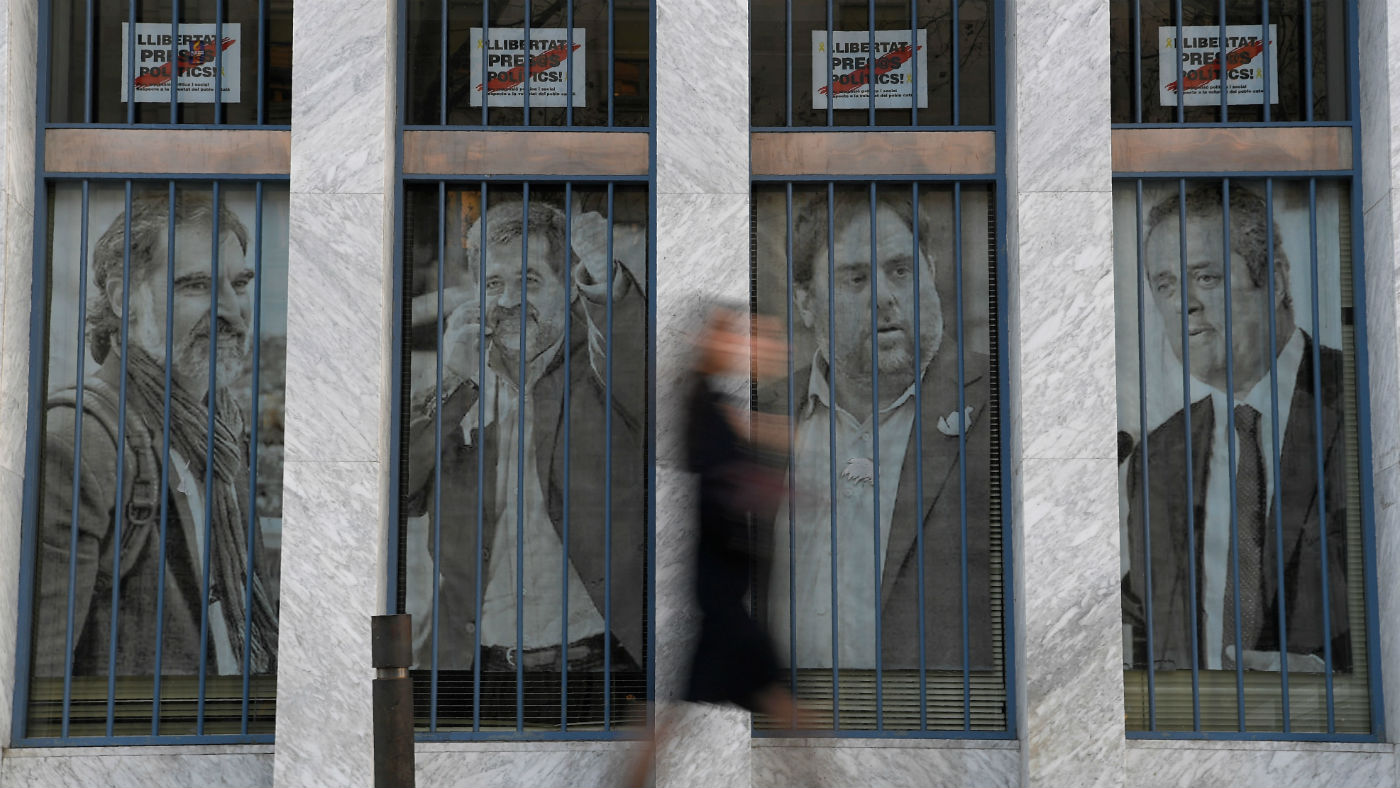Catalan separatists begin ‘trial of the century’ in Madrid
Twelve people appear before Supreme Court charged with rebellion

A free daily email with the biggest news stories of the day – and the best features from TheWeek.com
You are now subscribed
Your newsletter sign-up was successful
The long-awaited trial of Catalan’s separatist leaders has begun, in what Spain’s most senior judge has claimed is the most important case in the country’s democratic history.
Twelve people are appearing before the Supreme Court in Madrid on charges of rebellion and violating court orders. Nine of them could face 25 years in jail if found guilty of rebellion.
The semi-autonomous region triggered a standoff with the Spanish capital after attempting to push forward with secession in the autumn of 2017. It followed a brutal police crackdown during an independence referendum, deemed unconstitutional by Madrid, that sparked the country's worst political crisis since the restoration of democracy in the 1970s.
The Week
Escape your echo chamber. Get the facts behind the news, plus analysis from multiple perspectives.

Sign up for The Week's Free Newsletters
From our morning news briefing to a weekly Good News Newsletter, get the best of The Week delivered directly to your inbox.
From our morning news briefing to a weekly Good News Newsletter, get the best of The Week delivered directly to your inbox.
Supreme Court President Carlos Lesmes has described the case as “the most important trial we’ve had in democracy”, while The Guardian reports the “landmark proceedings” have been variously described as “the trial of the century, a 'stress test for Spanish democracy', and the single most important judicial event the country has seen since the end of the Franco dictatorship”.
Reuters says it “also exposes the workings of Spain’s democracy - relatively young by western European standards - to their widest scrutiny since a failed coup in 1981”.
Given the high-profile nature of the case and amid accusations the fate of the twelve has already been pre-determined, “the Spanish government has been keen to combat any claims of prejudice, publishing a file of documents to illustrate how Spain's justice system is as impartial and fair as its European counterparts”, reports Lauren Said-Moorhouse for CNN.
These included court rankings by the European Commission, the European Court of Human Rights and campaign-group Transparency International.
A free daily email with the biggest news stories of the day – and the best features from TheWeek.com
The trail will also be broadcast live on television “so that all can judge the neutrality of the country's highest court” says Said-Moorhouse.
Around 500 witnesses, including the former prime minister Mariano Rajoy, are expected to give evidence before the seven-judge panel reach a verdict.
Former vice-president of Catalonia Oriol Junqueras told the BBC that the “trial is an action against an ideology and against political dissent”.
“It's a judgement on democracy,” he said, and one “which creates a dangerous precedent for all of Europe”.
Junqueras is the most prominent figure from Catalan regional government to stand trial. Missing from proceedings, however, will be former leader of Catalonia, Carles Puigdemont, who is living in self-imposed exile in Brussels.
Supporters of the defendants says they are political prisoners and in November, more than 100 legal experts from across Spain signed an open letter condemning the use of the charge of rebellion in the Catalan case.
But the government says they are being judged strictly in line with the rule of law under the constitution, which bans any Spanish region from seceding.
The politically charged trial, which is expected to last at least three months, “comes at a pivotal time for Spain's government”, Al Jazeera says.
A snap national election is likely unless Catalan nationalist lawmakers change track by ending their opposition to the 2019 budget in a vote on Wednesday.
-
 Britain’s ex-Prince Andrew arrested over Epstein ties
Britain’s ex-Prince Andrew arrested over Epstein tiesSpeed Read The younger brother of King Charles III has not yet been charged
-
 Political cartoons for February 20
Political cartoons for February 20Cartoons Friday’s political cartoons include just the ice, winter games, and more
-
 Sepsis ‘breakthrough’: the world’s first targeted treatment?
Sepsis ‘breakthrough’: the world’s first targeted treatment?The Explainer New drug could reverse effects of sepsis, rather than trying to treat infection with antibiotics
-
 Epstein files topple law CEO, roil UK government
Epstein files topple law CEO, roil UK governmentSpeed Read Peter Mandelson, Britain’s former ambassador to the US, is caught up in the scandal
-
 Iran and US prepare to meet after skirmishes
Iran and US prepare to meet after skirmishesSpeed Read The incident comes amid heightened tensions in the Middle East
-
 Israel retrieves final hostage’s body from Gaza
Israel retrieves final hostage’s body from GazaSpeed Read The 24-year-old police officer was killed during the initial Hamas attack
-
 China’s Xi targets top general in growing purge
China’s Xi targets top general in growing purgeSpeed Read Zhang Youxia is being investigated over ‘grave violations’ of the law
-
 Panama and Canada are negotiating over a crucial copper mine
Panama and Canada are negotiating over a crucial copper mineIn the Spotlight Panama is set to make a final decision on the mine this summer
-
 Why Greenland’s natural resources are nearly impossible to mine
Why Greenland’s natural resources are nearly impossible to mineThe Explainer The country’s natural landscape makes the task extremely difficult
-
 Iran cuts internet as protests escalate
Iran cuts internet as protests escalateSpeed Reada Government buildings across the country have been set on fire
-
 US nabs ‘shadow’ tanker claimed by Russia
US nabs ‘shadow’ tanker claimed by RussiaSpeed Read The ship was one of two vessels seized by the US military